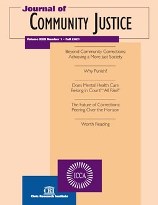Complete Issue
Author: Don Evans.
Source: Volume 24, Number 03, Spring 2015 , pp.1-28(28)

< previous article |return to table of contents
Abstract:
The changing nature of supervised populations in community settings will be a major concern for correctional planners and practitioners in the coming years. Two issues emerging are the aging of offender populations and the employment needs of released women offenders. There are a number of assumptions and rationales related to these populations, and JCC will continue to explore programs and practices that assist in providing direction for practitioners working with them. Victoria Terranova and Scott W. Bowman draw attention in their study to the neglected population of elderly probationers. They identify the financial and health issues facing this population as well as the disconnect that exists between the elderly probationer and the probation officer. The paper includes recommendations and ways to sensitize probation officers to the physical situation of elderly probationers. This is a much needed study that we hope will be followed by more research and program innovation. A main concern in the community supervision of offenders relates to adequate employment opportunities and how best to assist offenders in seeking employment given the restrictive barriers that they encounter. Ashley Brown reports on a symposium held in Toronto in 2014 on women offenders’ employment needs. The symposium was a result of collaboration between ICCA, the Correctional Services of Canada, and the St. Leonard’s Society of Toronto. The importance of employment in reducing recidivism was noted as was the value of working closely with other agencies and the community to enhance the job opportunities for women offenders and minimize the effect of the barriers they face. Phil Nunes, president of ICCA, appeared before the Charles Colson Task Force on March 11, 2015, to provide testimony to assist the task force in providing recommendations to help federal corrections meet the challenges they are facing in making the system safer, less expensive, and more humane. Nunes draws attention to the large body of research and evidence-based practices that can help address the challenges currently facing corrections. Russ Immarigeon, our book review editor, has selected four titles that should become references in any agency’s library. The reviews that caught my attention and that relate to some of the material covered in ICCA’s 2014 annual conference, include the review of Chris Trotter’s useful guide for working with the involuntary client, Patricia Griffin and colleagues’ collection of articles on the sequential intercept model as a basis for providing community alternatives for individuals with serious mental illness, and Bain and Guthrie’s handbook of resources for promoting positive change. These books should be made available to practitioners working directly with offenders.Keywords: Elderly probationers; Pathways to Employment; ICCA President’s Testimony to the Colson Task Force
Affiliations:
1: Contributing Editor.